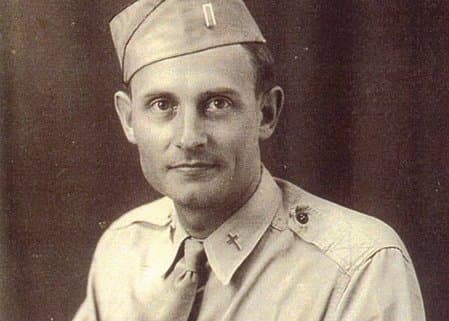NEW YORK – A Catholic priest from the Diocese of Wichita who served as an Army chaplain in World War II and the Korean war, known for risking his life to minister to troops on the front lines, will soon have a permanent statue in his honor at the state Capitol.
On March 22, Kansas Gov. Laura Kelly signed Senate Bill 431, which directs the Capitol Preservation Committee to create a memorial honoring Father Emil Joseph Kapaun at the state Capitol. The bill passed through both chambers of the Kansas Legislature with unanimous votes.
“The Diocese is thrilled to witness the desire of the people of Kansas to honor one of her own priests, and we are happy to be a part of the many individuals and organizations who will contribute to the memorial of Fr. Kapaun at the statehouse in Topeka,” Bishop Carl Kemme of Wichita said in a statement.
Born in 1916 on a rural farm in Kansas, Kapaun was ordained a Catholic priest in 1940 and joined the U.S. Army Chaplain Corps in 1944. In 1946 he separated from the Army and spent the next two years earning an advanced degree in education, enlisting as a chaplain for the second time in 1948.
In 1950, while serving as a chaplain in the Korean War, Kapaun was taken prisoner. A biography of Kapaun published on the U.S. Army’s website states that during the battle where Kapaun was captured he negotiated for the safety of wounded Americans, physically intervened to stop an execution, and rejected multiple opportunities for escape and instead volunteered to stay and care for wounded.
After Kapaun was taken prisoner on November 2, 1950, he spent the next seven months in prison camps in what is now North Korea. Over that span, the biography states, Kapaun tended to the sick and wounded, scoured for food, built fires against guards’ commands, and fashioned iron sheet vessels to launder the clothing of the wounded and purify drinking water.
Kapaun also led prayers and spiritual services for the prisoners of war. Upon return, survivors of the prison camps told stories of Kapaun’s courage, compassion, and spirit, according to the biography. They also credited him with saving their lives and hundreds of others.
Kapaun died in the prison camp on May 23, 1951, at the age of 35. Originally unidentified, in 2021 the Defense POW/MIA Accounting Agency (DPAA) identified Kapaun’s remains among the hundreds of unidentified Korean War remains buried in the National Cemetery of the Pacific in Hawaii on March 4, 2021. His remains were returned to Kansas in September that year, and on September 29, 2021, they were entombed inside the Cathedral of the Immaculate Conception in Wichita.
In 1993, Kaupan was declared a Servant of God by Pope John Paul II – the first step towards sainthood. The Vatican is investigating at least two possible miracles linked to Kapaun. The Vatican in 2015 denied a request to declare Kapaun a martyr, which would have fast-tracked his becoming a saint.
Separate from the Church, Kapaun was also awarded the Medal of Honor in 2013.
Signing the legislation to honor Kapaun, Kelly highlighted his selflessness, and dedicated service.
“Father Emil Kapaun was known for his selfless, dedicated service and providing care to all, regardless of their religion or beliefs,” Kelly said in a statement. “I am proud to honor his legacy and sacrifices for our country by signing this bipartisan bill.”
Other notable statues in or on the grounds of the Kansas Capitol commemorate Abraham Lincoln, Dwight D Eisenhower, and Ameila Earheart.
Kemme said Kansas State Senator Chase Blasi was the one who initially approached the diocese with the idea of the bill. In a statement, Blasi said “Father Kapaun’s bravery and service is commendable.”
“He worked tirelessly to care for many courageous Americans fighting for our freedom in both World War II and the Korean War,” Blasi said. “It’s an honor to recognize his commitment and valor with this memorial.”
Follow John Lavenburg on Twitter: @johnlavenburg














